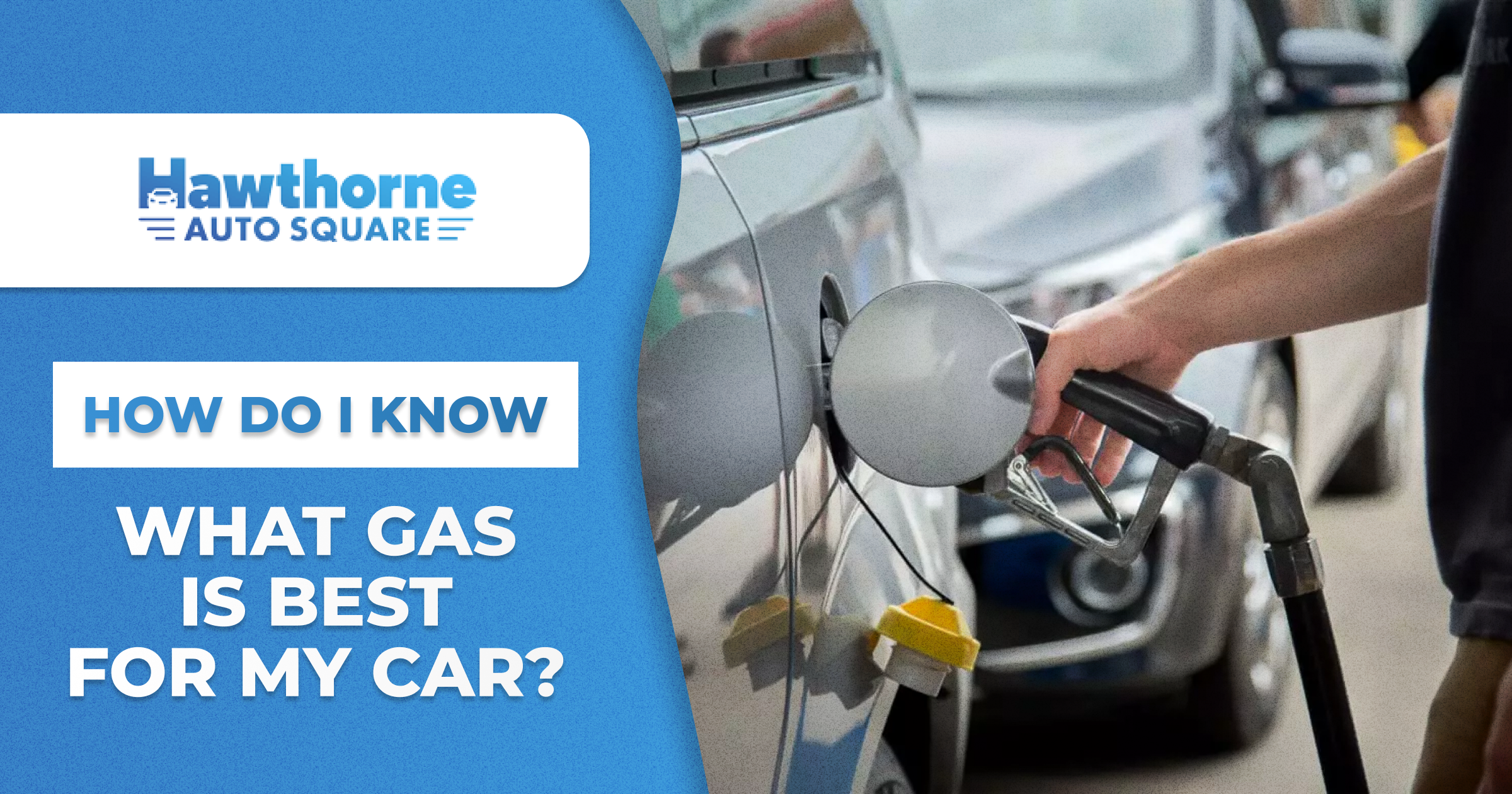
- SALES : (866) 707-7664
- PAYMENTS : (866) 902-7955
- 11646 PRAIRIE AVE, HAWTHORNE, CA 90250
- MON - SAT 8AM - 8PM | SUN 10AM - 6PM
- SALES : (866) 707-7664
- PAYMENTS : (866) 902-7955
- 11646 PRAIRIE AVE, HAWTHORNE, CA 90250
- MON - SAT 8AM - 8PM | SUN 10AM - 6PM
How Do I Know What Gas Is Best for My Car?

Not knowing what gas is best for your car can leave you scratching your head at the gas station. No one wants to be in that situation. But with different types of gasoline, it’s important to know which one your engine requires.
The vehicle’s owner’s manual usually says what type of fuel to use. It may also be listed by the gas cap and even near the fuel gauge too. Buy premium fuel only if your car uses it (that’s 91 or 93 octane gas). Otherwise, fill it up with regular fuel.
Is Higher-Octane Gas of Better Quality?
One thing is for sure, higher-octane gas won’t increase the performance of your car if it doesn’t require it. Octane isn’t a measure of the energy a fuel has. The main consideration is what your car requires. Gasoline with a higher number is more resistant to preignition, or when the air-fuel mixture ignites prematurely. A vehicle in which the engine has a higher fuel-air compression ratio (to generate more power) uses a higher octane because the heat generated increases the likelihood of earlier ignition.
In this case, using a lower octane gas can cause preignition, knocking, and engine damage. Knock sensors in newer cars can prevent preignition. However, this can reduce engine power and fuel efficiency. Another consideration is if your vehicle has a diesel engine. If you fill the tank with anything other than diesel fuel, the engine will not run and can potentially be catastrophically damaged.
Then again, if your vehicle manufacturer indicates “premium fuel recommended”, regular, midgrade, or premium can be used. Higher-octane fuel may just give you a little more fuel economy. But using regular gas won’t damage the engine.
Other Fuel Considerations
Whether you buy a new or used car, you may run into some other factors. Here are some other considerations to help you know what gas is best for your car:
- E85: E85 is a different type of fuel. It’s a blend of 85% ethanol and 15% gasoline, which contributes to less pollution. Some flex-fuel vehicles can run on gasoline or E85, but generally don’t get as good a fuel economy. Adding E85 to a non-capable vehicle can void its warranty.
- RON 95/RON 98: These are used to specify some European cars, with RON 95 being equal to 87 octane (and thus meaning “regular”) and RON 98 being equal to 94 octane (which can be substituted with 93 octane fuel).
- High Altitudes: Lower-octane fuel is often sold at higher elevations. It is suited for older vehicles built before 1975. However, modern fuel-injected engines can adjust to lower oxygen content. Therefore, continue to use the manufacturer’s recommended octane. If your car uses high-octane fuel, it may not be available, so fuel up at a lower altitude if you’re traveling into the mountains.
Can I Mix Fuels?
This is generally okay. If you add a higher-octane fuel to the tank, it will tend to dilute the lower-octane fuel. The result can be an averaging out of the octane. So, this is a consideration if you’re running low on fuel but still at higher elevations. To be safe, just buy the minimum quantity of the closest octane to what your vehicle takes that you can find.
Buy a Used Car at Hawthorne Auto Square
We provide most makes and models of used cars, trucks, SUVs, and minivans. These are low-mileage, high-quality vehicles that are ready for the road. In-house financing is available with fast approval, regardless of your credit. A comprehensive warranty and service and maintenance plan are available as well. Visit our dealership for help finding the right vehicle for you and get answers to your questions including what gas is best for your car. To learn more, call 866-707-7664.
Latest News


Why Should I Buy a Used Toyota Camry?

Bankruptcy and Car Ownership: How BHPH Can Help


Used Car Price Trends for 2025: What Buyers & Sellers Need To Know
Get approved
It only takes a few minutes and won’t affect your credit.
- Pre-Inspected Cars
- Clean Title
- Under Warranty
Latest Videos
What Do I Need To Buy A Car - Hawthorne Auto Square
Second Chance for a New Car - Hawthorne Auto Square
Pre Approved Auto Lone – Hawthorne Auto Square
- SALES : (866) 707-7664
- PAYMENTS : (866) 902-7955
- 11646 PRAIRIE AVE, HAWTHORNE, CA 90250
- MON - SAT 8AM - 8PM | SUN 10AM - 6PM
© 2025 Hawthorne Auto Square. All Rights Reserved. Website Designed by: Ad Leverage | Privacy Policy | Terms of Service | Manage Cookies | DSAR |License #91864
© 2025 Hawthorne Auto Square. All Rights Reserved. Website Designed by:
Ad Leverage | Privacy Policy | Terms of Service
License #91864

